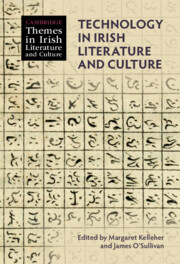Book contents
- Technology in Irish Literature and Culture
- Cambridge Themes in Irish Literature and Culture
- Technology in Irish Literature and Culture
- Copyright page
- Epigraph
- Contents
- Contributors
- Cambridge Themes in Irish Literature and Culture
- Acknowledgements
- Introduction
- Part I Genealogies
- Part II Infrastructures
- Part III Invention
- Part IV The Digital
- Chapter 14 Irish Literary Feminism and Its Digital Archive(s)
- Chapter 15 Consoling Machines in Contemporary Irish Fiction
- Chapter 16 ‘At Me Too Someone Is Looking’: Staging Surveillance in Irish Theatre
- Chapter 17 Technology in Contemporary Irish Poetry: Data at ‘the Edge of Language’
- Chapter 18 Irish Digital Literature
- Index
- References
Chapter 16 - ‘At Me Too Someone Is Looking’: Staging Surveillance in Irish Theatre
from Part IV - The Digital
Published online by Cambridge University Press: 19 January 2023
- Technology in Irish Literature and Culture
- Cambridge Themes in Irish Literature and Culture
- Technology in Irish Literature and Culture
- Copyright page
- Epigraph
- Contents
- Contributors
- Cambridge Themes in Irish Literature and Culture
- Acknowledgements
- Introduction
- Part I Genealogies
- Part II Infrastructures
- Part III Invention
- Part IV The Digital
- Chapter 14 Irish Literary Feminism and Its Digital Archive(s)
- Chapter 15 Consoling Machines in Contemporary Irish Fiction
- Chapter 16 ‘At Me Too Someone Is Looking’: Staging Surveillance in Irish Theatre
- Chapter 17 Technology in Contemporary Irish Poetry: Data at ‘the Edge of Language’
- Chapter 18 Irish Digital Literature
- Index
- References
Summary
This chapter argues that Samuel Beckett’s plays function as a kind of fulcrum in a theatrical history of staging and thematising surveillance, extending from Dion Boucicault’s The Octoroon (1859) through Augusta Gregory’s Spreading the News (1904), to Enda Walsh’s Arlington (2016) and David Lloyd’s The Press (2009) and The Pact (2021). Surveillance agencies rely heavily on technology to gather information, but depend on human beings to store, order, and interpret it, and dramatic narratives exploit inconsistencies and injustices arising from slippages between data and its application. Boucicault, Gregory, Walsh, and Lloyd are counterpointed to Beckett’s Waiting for Godot, Endgame, Catastrophe, and What Where, which theatricalise the structuring influence of monitoring and scrutiny on the texture of Irish social experience, personal and public. Once classified in an archive or record, or interpreted in policy and implemented in practice, ‘intelligence’ plays out less as a function of rigorous analysis than ideological determination.
Keywords
- Type
- Chapter
- Information
- Technology in Irish Literature and Culture , pp. 267 - 283Publisher: Cambridge University PressPrint publication year: 2023

